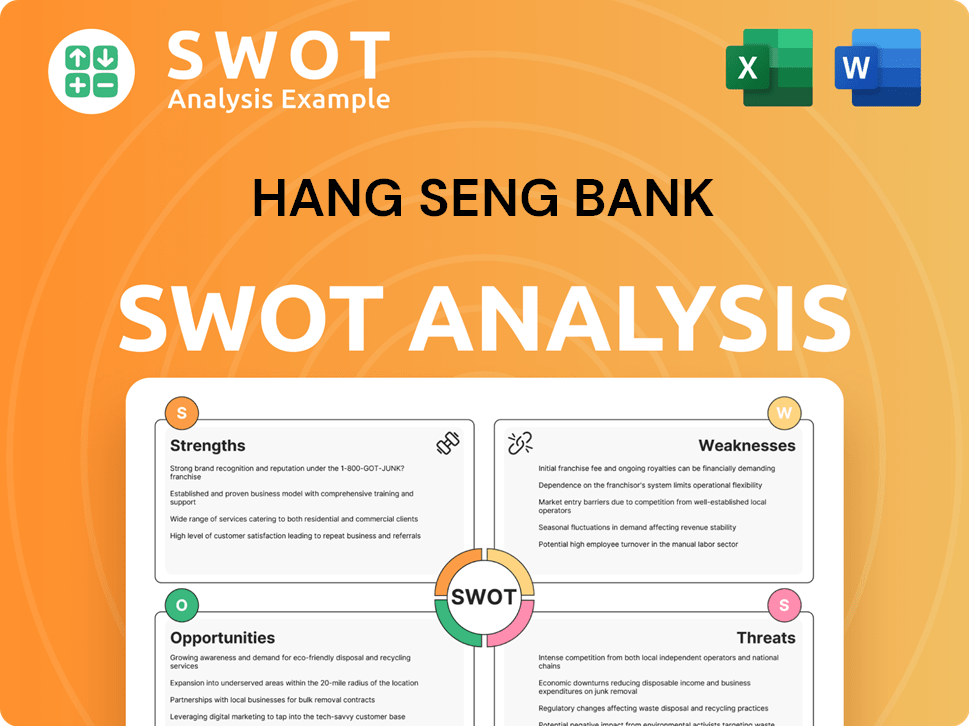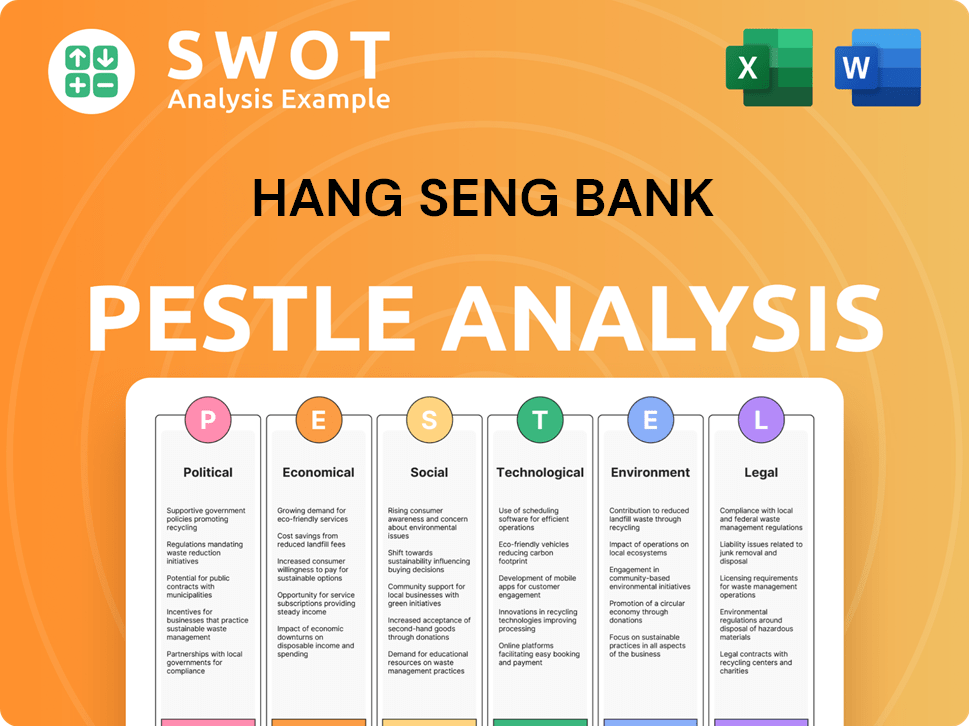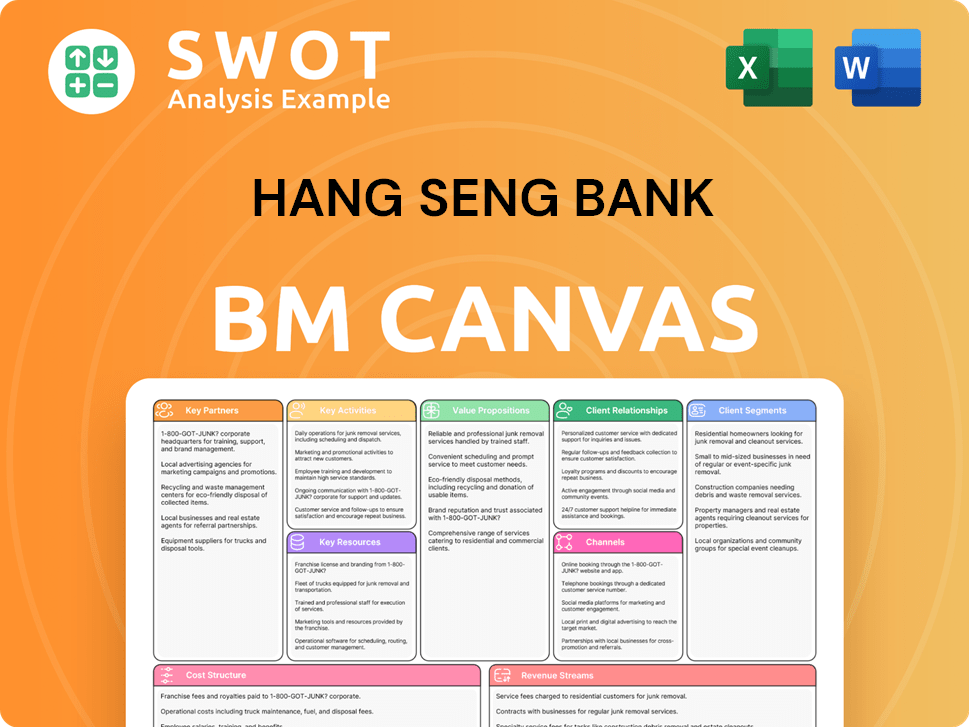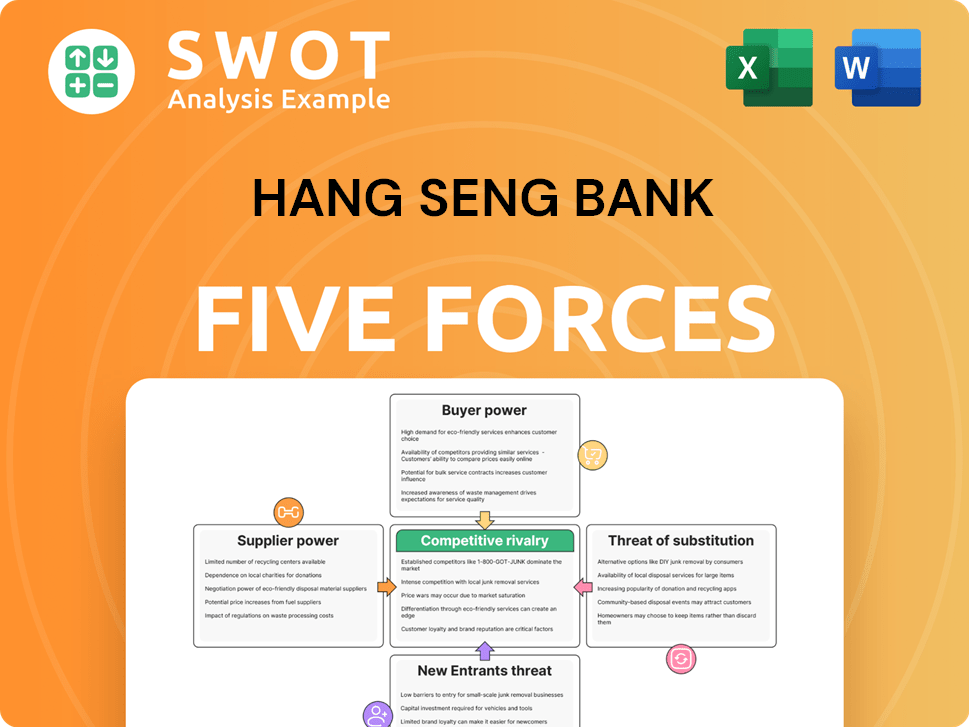Hang Seng Bank Bundle
How Does Hang Seng Bank Thrive in Hong Kong's Financial Landscape?
Hang Seng Bank, a financial powerhouse in Hong Kong, recently showcased impressive financial results for 2024, including a notable surge in non-interest income. With nearly 4 million customers, it's a critical player in the Hang Seng Bank SWOT Analysis, offering a wide array of financial services. Understanding Hang Seng Bank operations is key to grasping its influence on the Hong Kong stock market and the broader financial services landscape.

This analysis will explore the core of Hang Seng Bank, examining its operational strategies and revenue streams, which have enabled it to maintain a strong position in the competitive Banking in Hong Kong market. We'll delve into its strategic initiatives and industry standing, providing insights for investors, customers, and anyone interested in the financial performance of HSBC Hong Kong's key competitor. This investigation aims to clarify how Hang Seng Bank navigates challenges and plans for sustainable expansion.
What Are the Key Operations Driving Hang Seng Bank’s Success?
Hang Seng Bank delivers value through a wide array of financial products and services tailored for both personal and commercial clients. Its core business areas include retail banking, wealth management, and corporate banking. These are complemented by offerings in insurance, investment, and treasury services, providing a comprehensive suite of financial solutions. The bank serves a diverse customer base, from individual consumers needing everyday banking to large corporations requiring sophisticated financial instruments.
Hang Seng Bank operations are streamlined through a blend of physical and digital channels. The bank maintains an extensive network of over 250 service outlets in Hong Kong, ensuring an omnichannel experience for its customers. Digital platforms are crucial, with 92% of transactions by Hang Seng Commercial Banking customers completed digitally by the end of 2024. This digital focus is supported by initiatives like 'Future Banking 2.0' and the 'Come to You' service.
The bank's operational efficiency is partly due to its association with HSBC, a major member of the HSBC Group. This affiliation offers benefits such as cross-access to ATM networks. The bank has demonstrated its ability to adapt and expand its market reach, as seen by a significant increase in new-to-bank affluent customers (a 75% rise in 2024) and an 81% surge in new account openings for retail mainland China customers. The establishment of its flagship Cross-boundary Wealth Centre in Central, Hong Kong, further illustrates its dedication to integrated financial services, supported by an expansion of its wealth management professional team by over 50%.
Offers a range of services including savings and current accounts, mortgages, and personal loans. Provides everyday banking solutions for individual customers. Includes access to a wide ATM network and online banking features.
Provides investment products, financial planning, and legacy planning services. Launched 'Wealth Master,' a digital investment platform. Offers access to a wide selection of funds and personalized investment advice.
Offers financial solutions for businesses, including loans, trade finance, and cash management services. Supports the financial needs of businesses of various sizes. Provides specialized services for corporate clients.
Emphasizes digital channels for transactions and customer service. The 'Come to You' service concept uses Smart Tellers. Focuses on enhancing customer service and operational efficiency through digital transformation.
HSBC Hong Kong's close ties contribute to operational efficiencies and cost management. The bank's focus on digital transformation and customer service enhancements. Expansion into wealth management and cross-boundary financial services.
- Extensive branch network across Hong Kong.
- Strong digital banking capabilities.
- Focus on customer-centric services.
- Integrated financial solutions for diverse customer needs.
Hang Seng Bank SWOT Analysis
- Complete SWOT Breakdown
- Fully Customizable
- Editable in Excel & Word
- Professional Formatting
- Investor-Ready Format

How Does Hang Seng Bank Make Money?
Hang Seng Bank's revenue streams are diversified, encompassing both interest and non-interest income, which contribute to its financial health. In 2024, the bank reported a total operating profit of HK$21,558 million. While net interest income saw a slight decrease, non-interest income experienced significant growth, highlighting successful diversification efforts.
The bank's financial performance in 2024 shows resilience and strategic adaptation. Despite a 5% decrease in net interest income, non-interest income surged by 26%, driven by strong performance in wealth management and other key areas. This shift underscores Hang Seng Bank's ability to navigate market changes and capitalize on new opportunities.
This diversification led to non-interest income comprising 26% of net operating income in 2024, up from 21% in 2023. This demonstrates the bank's success in expanding its revenue sources beyond traditional interest-based income. The bank's operations are a key part of the financial services landscape in Hong Kong.
The primary sources of revenue for Hang Seng Bank include net interest income and non-interest income, each playing a crucial role in its financial performance. The bank's ability to generate income from diverse sources helps to maintain its profitability and navigate economic fluctuations. For a broader perspective, consider the Competitors Landscape of Hang Seng Bank.
- Net Interest Income: This income stream is derived from the difference between the interest earned on loans and investments and the interest paid on deposits. Although it decreased by 5% in 2024, it remains a significant contributor to overall revenue, totaling HK$30,784 million.
- Non-Interest Income: This category experienced a substantial 26% increase in 2024, primarily due to growth in the wealth management business, which improved by 22% year-on-year. Non-interest income accounted for 26% of net operating income in 2024, up from 21% in 2023.
- Investment Services Income: This increased by 28% in 2024. While structured product income from wealth management saw a 40% decline in H1 2024 compared to the same period last year, income from retail investment funds increased by 20%.
- Life Insurance Income: This increased by 17% in 2024, with Hang Seng Bank becoming the second-largest life insurer by new business premiums, which grew by 80%.
- Net Fee Income: This grew by 8% to HK$5,316 million, primarily due to strong performance in investment services and securities broking.
Hang Seng Bank employs innovative strategies to boost revenue, including cross-boundary business initiatives and specialized financial products. These strategies are designed to attract new customers and enhance the value of existing services. The bank's focus on digital banking features and customer service further supports its monetization efforts.
- Cross-Boundary Business Initiatives: These initiatives have shown significant growth. New account openings for retail mainland China customers surged by 81% year-on-year in 2024, driven by integrated banking and wealth management services.
- Specialized Products: The bank has launched products like 'LegendPower' and 'IncomePower' life insurance plans, offering potential annualised returns and income generation. Incentives for opening Prestige Banking accounts are also provided.
- Enhanced Transaction Efficiency: The introduction of the 'Hang Seng Commercial Multi-Currency Debit Mastercard' aims to enhance transaction efficiency for businesses by offering instant debit and zero transaction fees in 12 designated currencies, effectively saving on foreign exchange costs.
Hang Seng Bank PESTLE Analysis
- Covers All 6 PESTLE Categories
- No Research Needed – Save Hours of Work
- Built by Experts, Trusted by Consultants
- Instant Download, Ready to Use
- 100% Editable, Fully Customizable

Which Strategic Decisions Have Shaped Hang Seng Bank’s Business Model?
The journey of Hang Seng Bank has been marked by pivotal milestones and strategic initiatives that have significantly influenced its operational framework and financial outcomes. A notable recent achievement is the robust financial performance for the full year of 2024, showcasing an 8% increase in operating profit and a substantial 26% rise in non-interest income. This reflects the bank's capacity to diversify revenue streams, even amidst complex geopolitical and economic uncertainties. This performance was supported by accelerating growth in its retail customer base, both in Hong Kong and mainland China.
Operationally, Hang Seng Bank has been adapting to the dynamic market conditions by prioritizing digital transformation and enhancing customer experience. The renovation of its Hong Kong Main Branch, along with the launch of the 'Future Banking 2.0' initiative and the 'Come to You' service concept in late 2024, aims to integrate technology with personalized service, with renovations expected to be fully completed by mid-2025. Furthermore, the opening of its flagship Cross-boundary Wealth Centre in Central in May 2025 is a strategic move to cater to the increasing demand for cross-border wealth management services.
However, the bank has also faced challenges, including a rise in impaired loans, particularly due to exposure to the property sector in mainland China and, more recently, in Hong Kong. As of the end of 2024, impaired loans constituted 6.1% of its gross loans, a notable rise from 2.8% at the end of 2023. In response, Hang Seng Bank has taken a proactive approach to de-risk its portfolio, significantly reducing its exposure to mainland China commercial real estate to around 2% of its total loan book by year-end 2024. The bank also announced a restructuring initiative in May 2025, which may result in job losses for approximately 1% of its core workforce, aiming to boost efficiency and service quality through technology integration.
In 2024, Hang Seng Bank achieved an 8% increase in operating profit. Non-interest income saw a significant rise of 26%, demonstrating successful revenue diversification. The bank's retail customer base experienced strong growth, with a 75% jump in new affluent customers.
The bank is focused on digital transformation and enhancing customer experience. The 'Future Banking 2.0' initiative and 'Come to You' service concept are key. The flagship Cross-boundary Wealth Centre opened in Central in May 2025 to cater to cross-border wealth management.
Impaired loans rose to 6.1% of gross loans by the end of 2024. The bank reduced its exposure to mainland China commercial real estate. A restructuring initiative in May 2025 aims to boost efficiency through technology integration.
Strong brand strength as a leading domestic bank in Hong Kong. Long-standing relationship with HSBC provides stability. Prudent risk management approach is a key focus. The bank continues to adapt to new trends and technology shifts.
Hang Seng Bank's competitive advantages include its strong brand presence as a leading domestic bank in Hong Kong, serving nearly 4 million customers. Its association with HSBC, as a principal member of the HSBC Group, provides a stable foundation and potential for cost efficiencies. The bank emphasizes a prudent and forward-looking risk management approach, which it believes provides a solid foundation for future growth. To understand more about the bank's target market, you can read this article about Target Market of Hang Seng Bank.
- Strong brand recognition and customer base.
- Strategic partnership with HSBC.
- Focus on prudent risk management.
- Investment in digital capabilities and sustainable finance.
Hang Seng Bank Business Model Canvas
- Complete 9-Block Business Model Canvas
- Effortlessly Communicate Your Business Strategy
- Investor-Ready BMC Format
- 100% Editable and Customizable
- Clear and Structured Layout

How Is Hang Seng Bank Positioning Itself for Continued Success?
As a leading domestic bank, Hang Seng Bank holds a significant position within the Hong Kong banking industry. It's the fourth-largest bank in Hong Kong, holding a 7% market share of deposits as of the end of 2023. Its extensive network and strategic presence in mainland China highlight its strong reach and customer loyalty, solidifying its role in banking in Hong Kong.
Despite its robust standing, Hang Seng Bank operations face several risks. These include geopolitical and macroeconomic uncertainties, and a notable increase in impaired loans. The bank has proactively reduced its exposure to mainland China commercial real estate, but challenges remain. Furthermore, subdued loan demand has led to a narrowing of the net interest margin in 2024.
In the Hong Kong banking sector, Hang Seng Bank is a key player, ranked fourth in terms of deposit market share. It competes with major players like HSBC Hong Kong and Bank of China (Hong Kong). The bank’s substantial network of over 250 service outlets in Hong Kong and a presence in mainland China through its subsidiary, Hang Seng Bank (China) Limited, supports its strong market position. To learn more, see Brief History of Hang Seng Bank.
Key risks include geopolitical and macroeconomic uncertainties, and increasing impaired loans. Impaired loans rose from 2.8% at the end of 2023 to 6.1% at the end of 2024, mainly due to exposures in the property sector. The bank is also facing a challenging market environment with subdued loan demand. These factors impact financial services Hong Kong and the broader Hong Kong stock market.
The bank is focused on sustainable growth, enhancing digital services, and expanding wealth management. It plans to continue investing in its capabilities and supporting the community. The launch of new services and expansion of wealth management aim to meet the rising demand for financial services. The bank anticipates that economic uncertainties will persist in 2025.
Initiatives include enhancing digital services, as evidenced by 92% of commercial banking transactions being digital by end-2024, and the launch of the 'Hang Seng Commercial Multi-Currency Debit Mastercard'. It is also expanding its wealth management services, including the opening of its Cross-boundary Wealth Centre in May 2025. The bank continues to integrate ESG principles into its operations and offer green financing solutions to businesses.
In 2024, Hang Seng Bank saw its net interest margin narrow to 2.20%. The bank is actively involved in promoting financial inclusion through programs like 'JC PROJECT LIFT,' which achieved HK$15 million in total savings by April 2025. By the end of 2024, the bank had reduced its mainland China commercial real estate exposure to around 2% of its total loan book.
- Digital transformation is a priority, with 92% of commercial banking transactions being digital by end-2024.
- The Cross-boundary Wealth Centre is set to open in May 2025 to meet rising demand for cross-border financial services.
- The bank continues to integrate ESG principles and offer green financing solutions.
Hang Seng Bank Porter's Five Forces Analysis
- Covers All 5 Competitive Forces in Detail
- Structured for Consultants, Students, and Founders
- 100% Editable in Microsoft Word & Excel
- Instant Digital Download – Use Immediately
- Compatible with Mac & PC – Fully Unlocked

Related Blogs
- What are Mission Vision & Core Values of Hang Seng Bank Company?
- What is Competitive Landscape of Hang Seng Bank Company?
- What is Growth Strategy and Future Prospects of Hang Seng Bank Company?
- What is Sales and Marketing Strategy of Hang Seng Bank Company?
- What is Brief History of Hang Seng Bank Company?
- Who Owns Hang Seng Bank Company?
- What is Customer Demographics and Target Market of Hang Seng Bank Company?
Disclaimer
All information, articles, and product details provided on this website are for general informational and educational purposes only. We do not claim any ownership over, nor do we intend to infringe upon, any trademarks, copyrights, logos, brand names, or other intellectual property mentioned or depicted on this site. Such intellectual property remains the property of its respective owners, and any references here are made solely for identification or informational purposes, without implying any affiliation, endorsement, or partnership.
We make no representations or warranties, express or implied, regarding the accuracy, completeness, or suitability of any content or products presented. Nothing on this website should be construed as legal, tax, investment, financial, medical, or other professional advice. In addition, no part of this site—including articles or product references—constitutes a solicitation, recommendation, endorsement, advertisement, or offer to buy or sell any securities, franchises, or other financial instruments, particularly in jurisdictions where such activity would be unlawful.
All content is of a general nature and may not address the specific circumstances of any individual or entity. It is not a substitute for professional advice or services. Any actions you take based on the information provided here are strictly at your own risk. You accept full responsibility for any decisions or outcomes arising from your use of this website and agree to release us from any liability in connection with your use of, or reliance upon, the content or products found herein.